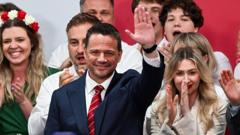Both candidates represent distinct futures for Poland. Trzaskowski, a pro-EU liberal, seeks to unify a divided nation, while conservative Nawrocki aims to maintain Poland's national sovereignty. As both leaders gear up for what appears to be a monumental week for the nation, their contrasting visions could reshape the country’s future in Europe.
With the official results pending, the stakes could not be higher for the future of Polish politics.
Trzaskowski, known for his liberal stances, led the election with a slight edge, having promised to prioritize unity and inclusivity. His rival, Nawrocki, insists the race is still up for grabs, calling on his supporters to stay optimistic. The political dynamics shift dramatically depending on who ultimately takes the helm.
The role of President in Poland is largely ceremonial, yet carries significant weight regarding legislative vetoes and foreign relations, especially with the evolving scenario in neighboring Ukraine and the EU. A confirmed win for Trzaskowski could help advance EU relations, while a Nawrocki presidency might signify a return to more conservative and nationalistic discourse.
This election cycle saw both candidates facing scrutiny, with scandal and contrasting personalities shaping the way voters perceive them. Trzaskowski, steered by a progressive narrative, aims to appeal to younger, urban voters, while Nawrocki, with roots in traditional values, resonates with conservative factions. As the tallies roll in, the vibrant political arena of Poland braces for a historic outcome.
With the official results pending, the stakes could not be higher for the future of Polish politics.
Trzaskowski, known for his liberal stances, led the election with a slight edge, having promised to prioritize unity and inclusivity. His rival, Nawrocki, insists the race is still up for grabs, calling on his supporters to stay optimistic. The political dynamics shift dramatically depending on who ultimately takes the helm.
The role of President in Poland is largely ceremonial, yet carries significant weight regarding legislative vetoes and foreign relations, especially with the evolving scenario in neighboring Ukraine and the EU. A confirmed win for Trzaskowski could help advance EU relations, while a Nawrocki presidency might signify a return to more conservative and nationalistic discourse.
This election cycle saw both candidates facing scrutiny, with scandal and contrasting personalities shaping the way voters perceive them. Trzaskowski, steered by a progressive narrative, aims to appeal to younger, urban voters, while Nawrocki, with roots in traditional values, resonates with conservative factions. As the tallies roll in, the vibrant political arena of Poland braces for a historic outcome.


















